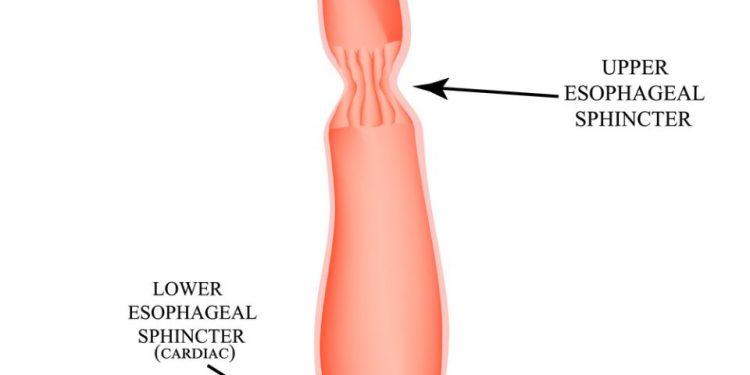Inflamed esophagus symptoms are caused by irritation or inflammation of the lining of the tube that carries food from the throat to the stomach. The inflammation may be a result of acid reflux, side effects from certain medications or a bacterial or viral infection. The inflammation can lead to ulcers, scarring and narrowing of the esophagus. It can also make swallowing painful or difficult.
The most common cause of esophagitis is gastroesophageal reflux disease (GERD). It occurs when stomach contents like acids back up into the throat. Other causes include viral infections such as cytomegalovirus, Epstein-Barr virus and varicella-zoster; pill-induced esophagitis from taking medications including alendronate, tetracycline, doxycycline, NSAIDs and antibiotics; fungal infection; and bacterial or parasitic infection.
Symptoms of esophagitis include pain in the chest or throat that is usually sharp, burning or heavy and feels worse after meals, while swallowing or when lying down. The pain may be constant, or it may come and go.
To confirm a diagnosis of esophagitis, your doctor will take a history of your symptoms and examine you. A barium X-ray of the esophagus may be performed to look for inflammation or narrowing. The most accurate way to check the esophagus is for your doctor to use an endoscope, which has a camera at the end of a flexible tube that is inserted down your throat. Your doctor will be able to view the lining of your esophagus and take biopsies from the tissue for further examination.

The diagnosis of eosinophilic esophagitis (EoE) is made based on symptoms and biopsy samples showing a high number of a specific type of white blood cell called eosinophils. This type of inflammation is a specific subtype of esophagitis that is often triggered by acid reflux.
Other types of esophagitis are treated differently. For example, if acid reflux is the cause, your doctor will recommend a change in your diet to reduce your intake of foods that are known to trigger acid reflux. This will likely mean eating smaller, more frequent meals, and avoiding spicy, acidic, and fatty foods as well as chocolate, caffeine, raw or hard foods. Your doctor may also prescribe medication to treat the acid reflux, such as a proton pump inhibitor.
Other types of esophagitis that are caused by infections or reactions to drugs are treated with a course of the appropriate medicines. For example, in cases of bacterial or viral infections, anti-inflammatory medications like ibuprofen or acetaminophen may be prescribed. Oral corticosteroids such as fluticasone sprayed in the mouth and swallowed, or a budesonide slurry taken by mouth, may be used for other forms of esophagitis. In some cases, surgery is recommended if the damage to the esophagus is severe. For other conditions such as GERD, a procedure called esophageal dilation is done to expand the diameter of the esophagus. This can help to relieve inflammation and reduce the frequency of symptoms.









